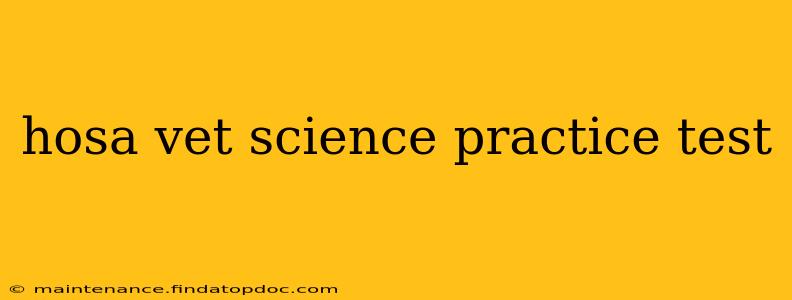The HOSA (Future Health Professionals) Veterinary Science competition demands a comprehensive understanding of animal care, medicine, and related procedures. This practice test will help you hone your knowledge and boost your confidence before the big day. Remember, consistent preparation is key to success! This isn't just about memorization; it's about applying your knowledge and demonstrating critical thinking skills.
What Topics are Typically Covered in the HOSA Vet Science Competition?
The HOSA Vet Science event covers a broad spectrum of veterinary-related topics. Expect questions covering:
- Animal Anatomy and Physiology: A solid grasp of animal body systems (digestive, circulatory, respiratory, etc.) is crucial.
- Animal Diseases: Understanding common animal illnesses, their symptoms, diagnosis, and treatment is essential.
- Animal Husbandry: This includes knowledge of animal nutrition, housing, breeding, and general care.
- Veterinary Procedures: Familiarity with common procedures like vaccinations, blood draws, and wound care is vital.
- Medical Terminology: Mastering veterinary terminology is essential for clear communication and understanding.
- Ethics and Professionalism: Understanding the ethical considerations and professional responsibilities within veterinary practice.
- Client Communication: Effectively communicating with pet owners is a significant aspect of the profession.
HOSA Vet Science Practice Questions:
Here are some sample questions to test your knowledge. Try to answer them without looking up the answers first!
1. What is the proper way to restrain a cat for a physical examination?
(a) Holding it firmly by the scruff of its neck (b) Wrapping it tightly in a towel (c) Gently cradling it in your arms (d) Using a cat carrier to confine the cat
2. Which of the following is a common symptom of feline leukemia virus (FeLV)?
(a) Excessive thirst (b) Weight gain (c) Increased energy levels (d) None of the above
3. What is the purpose of a fecal examination in veterinary medicine?
(a) To detect internal parasites (b) To measure blood glucose levels (c) To assess kidney function (d) To determine vaccination history
4. Describe the process of administering a subcutaneous injection.
This requires a detailed answer demonstrating your understanding of the procedure, including the appropriate location for injection and necessary safety precautions.
5. Explain the difference between a canine and feline heart rate.
This question assesses your knowledge of normal physiological parameters in different animal species.
6. What are some common zoonotic diseases that can be transmitted from animals to humans?
Provide a list of examples and explain preventative measures.
7. What is the importance of maintaining accurate medical records in a veterinary practice?
8. Explain the role of a veterinary technician in a veterinary clinic.
HOSA Vet Science: Addressing Common Questions
H2: What are some common mistakes students make in the HOSA Vet Science competition?
Many students fail to adequately prepare for the practical portion of the competition. Reviewing common veterinary procedures and practicing them (with appropriate supervision if applicable) is critical. Another common mistake is neglecting the ethical and professional aspects of veterinary medicine.
H2: How can I improve my knowledge of veterinary terminology?
Use flashcards, online quizzes, and veterinary textbooks to memorize key terms. Regularly reviewing and using the terms will help reinforce your understanding.
H2: What resources can I use to study for the HOSA Vet Science competition?
Numerous resources exist, including veterinary textbooks, online courses, veterinary websites, and practice tests. Check with your HOSA advisor for recommended materials.
H2: Are there any specific skills I need to practice for the hands-on portion?
Practical skills such as administering injections, taking vital signs, and restraining animals are crucial. Practice with mock scenarios and seek feedback from a knowledgeable mentor.
H2: What is the best way to prepare for the written exam portion?
Thorough review of veterinary science textbooks, online resources, and practice tests are key. Focus on understanding concepts rather than just memorizing facts.
This practice test offers a glimpse into the types of questions you might encounter. Remember to thoroughly research and study all aspects of veterinary science. Good luck!
